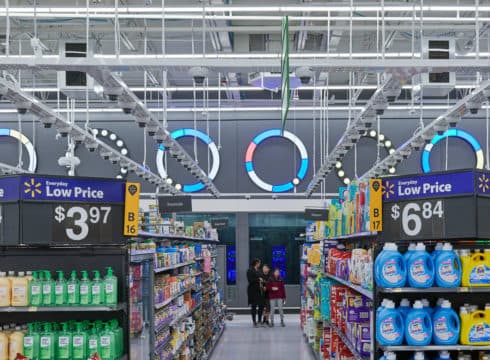Walmart has set up an intelligent retail lab in Levittown, New York
Intelligent Retail Lab is a portfolio company of Walmart's tech incubator Store No 8
IRL gathers information about what’s happening inside the store
Inc42 Daily Brief
Stay Ahead With Daily News & Analysis on India’s Tech & Startup Economy
Global retail giant Walmart has set up an intelligent retail lab in one of its 50,000 square feet store in Levittown, New York. With artificial intelligence-enabled cameras, interactive displays and a massive data center, this store, according to the company, is a sneak peak into the future of retail.
Walmart’s Intelligent Retail Lab (IRL) is a portfolio company of Walmart’s tech incubator Store No 8. IRL is set up to gather information about what’s happening inside the store through an array of sensors, cameras and processors.
To make customers understand the power of technology they have, the store includes multiple information stations for customers to visit to understand exactly how AI makes the store tick. Further, there are a number of educational displays as small educational kiosks are interspersed throughout the store. A Welcome Center at the front end allows customers to dive deeper into technical specifications and common questions.
One another interesting showcase is outside the Data Center are two large displays – one of which encourages participants to move around and learn how technology reacts to body positioning.
Mike Hanrahan, CEO of IRL, believes that this equipment will help the team focus on is product inventory and availability. In short, the team will use real-time information to explore efficiencies that will allow associates to know more precisely when to restock products, so items are available on the shelves when they’re needed.
In its early-days, IRL will be in data-gathering mode and will focus on learning from the technology and not implementing changes to operations in haste.
“You can’t be overly enamored with the shiny object element of AI. There are a lot of shiny objects out there that are doing things we think are unrealistic to scale and probably, long-term, not beneficial for the consumer,” Hanrahan said.
At present, the team is starting with real, practical solutions such as making sure shopping carts are available and registers are open.
Going forward, IRL’s more than 100 associates will be undertaking these retail experiments every day, getting a firsthand view of what’s possible for the future.
“With technology performing mundane tasks like evaluating if shopping carts need to be corralled, associates will be able to spend more time on tasks that humans can do best, such as helping customers or adding creative touches to merchandise displays,” the company said.
The retailers are projected to spend more than $7 Bn on AI over the next three years. Research company Tractica forecasts revenue generated from the direct and indirect application of AI-based software to grow from $643.7 Mn in 2016 to $36.8 Bn by 2025.
According to a Retail Automation Market report, the overall retail automation market is expected to be valued at $18.99 Bn by 2023, at a CAGR of 10.96 % between 2017 and 2023.
After the ecommerce wave where traditional retail stores expanded their presence online, the next wave of technology includes changing the offline infrastructure across industries. One such disruption is being driven by artificial intelligence and the latest user of this technology is global retail giant Walmart.
{{#name}}{{name}}{{/name}}{{^name}}-{{/name}}
{{#description}}{{description}}...{{/description}}{{^description}}-{{/description}}
Note: We at Inc42 take our ethics very seriously. More information about it can be found here.


